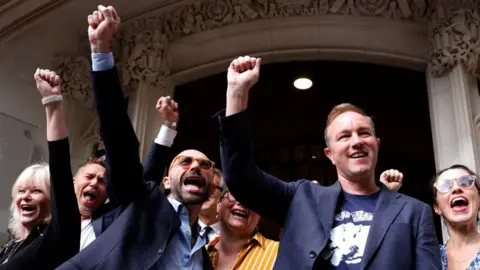UK Supreme Court Overturns Convictions in High-Profile Libor Rate-Rigging Case
City Traders’ Rate-Rigging Convictions Overturned After Decade-Long Battle
In a landmark decision that marks the end of a protracted legal saga, the Supreme Court has quashed the convictions of two former City traders, Tom Hayes and Carlo Palombo, who were at the center of one of the most significant scandals of the 2008 financial crisis. The ruling, delivered on Wednesday, represents a major victory for the defendants, who have consistently maintained their innocence throughout a decade-long struggle against accusations of manipulating benchmark interest rates.
The case, which has captured the attention of the financial world, revolved around allegations of manipulating the London Interbank Offered Rate (Libor) and the Euro Interbank Offered Rate (Euribor). These rates are crucial benchmarks used to determine borrowing costs for a vast array of financial instruments, including mortgages and commercial loans. Hayes and Palombo, along with others, were accused of conspiring to influence these rates for their personal gain, and for the benefit of their respective banks.
The Serious Fraud Office (SFO), which brought the case against the traders, has announced that it will not seek a retrial. This effectively closes the chapter on a complex and controversial legal battle that has spanned years and involved multiple appeals. The Supreme Court’s decision focused on the fairness of the trials, concluding that the proceedings against Hayes and Palombo were flawed.

Speaking outside the court, a visibly relieved Tom Hayes expressed his profound sense of vindication. He described the ordeal as “surreal” and acknowledged that the ruling had restored his faith in the justice system. “It’s been a long time coming, today we are vindicated and today is a happy day,” Hayes stated, encapsulating the sentiments of both defendants.
The convictions had significant consequences for the traders involved. Hayes, a former UBS trader, was initially sentenced to 15 years in prison, which was later reduced to 11 years on appeal. He served five and a half years before being released in January 2021. Palombo received a four-year sentence in 2019 and was also released in 2021. The quashing of their convictions now clears their names and acknowledges the injustice they faced.
Adding another layer of complexity to the case, US courts had previously quashed all American convictions related to the scandal in 2022, citing a lack of evidence of any wrongdoing. This left the UK as the sole jurisdiction where the actions of the traders were criminalized, until now. The Supreme Court’s decision brings the UK in line with the US, recognizing that the legal framework surrounding the case was flawed.
What was Libor?
Libor, the London Interbank Offered Rate, was a crucial interest rate, a benchmark used to set borrowing costs for trillions of dollars worth of financial deals. The rate became the focus of allegations of wrongdoing following the financial crisis in 2008. Dozens of City traders were accused of trying to manipulate the level at which Libor was set, to help the banks they worked for. Libor was phased out after 2021.
The reversal of the convictions is more than just a legal victory; it is a powerful commentary on the complexities of financial regulation and the challenges of prosecuting complex financial crimes. The case serves as a reminder of the devastating consequences of the 2008 financial crisis and the enduring impact on the lives of those caught in its wake.



Post Comment